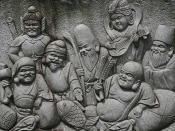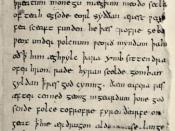Fate plays a significant role in the Old English epic poem Beowulf and William Shakespeare's play Macbeth.. The major events of the poem, such as the three killings by Beowulf and his own death, are said to have been predestined. In Macbeth, fate is so significant that it is personified by the Weird Sisters, who drive the action of the play. But if predestination exists, then there must be an agent that determines destiny. In Beowulf, God plays this role, and fate is generally accepted as God's will. In John Gardner's Grendel, a novel which serves as a commentary on the poem, fate is totally predetermined, and is the will of no being. By contrast, Macbeth's agents of fate are the Witches, who generally go against God's will.
In all three works, fate plays a powerful role, as it did in many prescientific cultures. Fate is a necessary element in these people's lives so that they can have some means of justifying aspects of their existence.
However, the fatal agents in the works differ; in looking at this, one must keep in mind that the three works were written in vastly different time periods, for different audiences, and for different purposes. Beowulf was intended to convert people to Christianity. It cannot be a true story, since it takes place in the sixth century (Raffel, 150), four centuries before Christianity came to Scandinavia. (Creed, 141) Most scholars agree that it was written by a Christian, in order to show how the belief in God can overcome evil. Shakespeare wrote Macbeth in 1606 for a Christian audience, perhaps in an attempt to impress the new king, James I. Since King James was an expert on witchcraft, Shakespeare gave the Witches a significant role in the play. Finally, Grendel was written in 1971,


